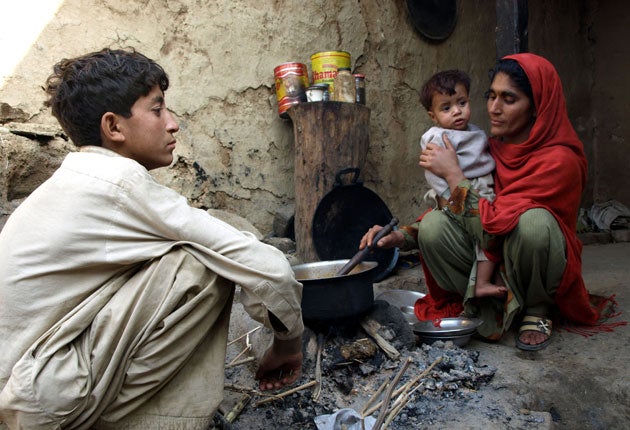The IoS Christmas Appeal: Pakistan's families caught in the crossfire
As little as £8 can provide counselling for victims of trauma

Your support helps us to tell the story
From reproductive rights to climate change to Big Tech, The Independent is on the ground when the story is developing. Whether it's investigating the financials of Elon Musk's pro-Trump PAC or producing our latest documentary, 'The A Word', which shines a light on the American women fighting for reproductive rights, we know how important it is to parse out the facts from the messaging.
At such a critical moment in US history, we need reporters on the ground. Your donation allows us to keep sending journalists to speak to both sides of the story.
The Independent is trusted by Americans across the entire political spectrum. And unlike many other quality news outlets, we choose not to lock Americans out of our reporting and analysis with paywalls. We believe quality journalism should be available to everyone, paid for by those who can afford it.
Your support makes all the difference."Something happened to me," said Rehmat Bibi. "I am afraid I will harm myself or my children, but when I have a fit, I don't know what I'm doing."
What happened to her was that she was injured in an air attack last spring, when Pakistani forces launched an offensive to seize back the Swat Valley from Taliban militants, and has been mentally disturbed ever since. "I can't tolerate noise or any quarrelling among the smaller children," she said. "I have tried to attack them with a brick, but I was stopped in time."
The mother of eight is among millions of Pakistanis whose lives have been wrecked in the struggle against Islamist extremism. As the Islamabad government tackles the militants at the urging of Britain and its Western allies, many innocent civilians have seen loved ones killed, their homes destroyed and their livelihoods lost. Millions have been displaced by the fighting, and even though nearly all the inhabitants of Swat have returned, families such as Rehmat's show the suffering has not ended.
She might seem more fortunate than some. None of the family was killed in the air strike last May, and her husband, Sahib Zadah, still has work as a labourer in a textile mill. But their home was left in ruins, and their 13-year-old son, Samiullah, is also suffering emotional problems. "He has anger attacks, and is no longer able to go to school," said his father. "It is sad, because he was doing well. But I can control him. His mother is worse – she has bitten her own tongue so badly that it bleeds for two or three days."
ActionAid, the charity supported by The Independent on Sunday's Christmas appeal, is working to help victims of trauma in Swat and the neighbouring district of Buner in north-west Pakistan. It costs as little as £8 to provide counselling for women such as Rehmat, and £100 to train a teacher to deal with trauma among pupils. Dozens of schools were damaged during the conflict – some, for girls, were targeted by the Taliban – and many children are still too afraid to return. Teachers say that most of those who have gone back are not able to concentrate as well as they once did.
Any support for his wife and son would be a relief to Sahib Zadah, who seems crushed by the disasters that have befallen his family. "When the bomb fell, Rehmat was hurt in the head and arm, and my sister Rukia, who lives with us, had boiling water from a cooking pot flung all over her," he said. "She was burned on the face, chest, arm and hands. It was 24 hours before we could get a doctor for her." Samiullah was at his uncle's house when the first bomb fell, and was running home when debris from a second blast hit him in the head, which may account for his changed behaviour.
The family is renting a house while Sahib Zadah rebuilds their home. "We feel more pressure because this is not our own place," he said, before revealing the cruel choices that face him. His 20-year-old sister has had reconstructive surgery, but needs three more operations, for which he cannot afford to pay. "We had to borrow 80,000 rupees [£580] for the first operation in Peshawar, but I am taking more loans all the time just to reconstruct our house," said Sahib Zadah. "That is taking priority at the moment."
Rehmat has also developed tuberculosis. "When we were in the refugee camp we were able to take her to the doctor every day, but since we returned in August she has had no treatment," said her husband. "We have no money for it." At this, Rehmat, who had appeared to be in something of a trance, suddenly spoke up. "I'm very sorry for the trouble I've caused," she said.
To donate now click here: www.actionaid.org.uk/ios
Join our commenting forum
Join thought-provoking conversations, follow other Independent readers and see their replies
Comments